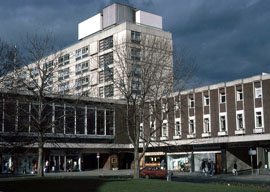
September 30, 2017

Giffard Hotel, Worcester
Recently I made reference to the criticism Simon Leys made of a book by Maria-Antonietta Macchiocchi. He said that the most charitable interpretation that could be put on it was that it was the product of stupidity; any other interpretation must involve outright fraud on the part of the authoress.
I once made use of a rather similar argument myself, in another context and before I knew of Leys’ criticism of Macchiocchi. I had written an article just after NATO had finished bombing Serbia suggesting that its cruise missiles should be turned on the thousands of hideous modern buildings in Great Britain. I was sure that British readers would have their own suggestions as to those that stood most urgently in need of demolition, but I suggested (for a start) certain modern buildings in the otherwise beautiful town of Shrewsbury, constructed no doubt at the behest and with the connivance of corrupt town councillors.
The latter, or some of them, were outraged, and I was asked to appear on the local radio with one of them.
“Are you saying that Shrewsbury town councillors are corrupt?” he asked.
“Don’t you understand,” I said (though I may at this distance in time be paraphrasing), “that that is the charitable interpretation? We all like money, so we can all understand if the council allowed these buildings for money. But if it were for some other reason… No, no, I can’t think as badly of you as that.”
Another suitable target for demolition that I suggested in my little article, the Giffard Hotel in Worcester, should really have been called the Elena Ceausescu Hotel. This single building managed to ruin an entire city once and for all; an 18th-century terrace of houses in the vicinity of the ancient cathedral was pulled down to make way for a large, gray, concrete rectangular slab that would not have been out of place in the suburbs of Moscow. (Someone I knew rescued the wainscoting of the demolished houses, which otherwise would have been merely thrown away.)
A local newspaper ran a headline:
‘Spectator’ says bomb Worcester!
And once again I was asked onto the local radio to discuss the matter with the unfortunate manager of the Giffard Hotel.
“What you have to remember,” he said, “is that it was built in the 1960s.”
“Yes,” I replied, “that is what I am complaining of.”
“Have you ever been inside?” he asked.
“I don’t need to go inside,” I replied. “I can see it’s awful and ought to be demolished.”
“What if I gave you lunch?”
“I don’t see what lunch has to do with it,” I said.
What if I gave you lunch?: In these five words are the key to the soul of modern Great Britain, now the world leader in what might be called corruption-without-real-corruption, a typical product of Anglo-Saxon humbug and hypocrisy. The manager (poor fellow) thought that a free lunch—free to me, that is—would be sufficient for me to write that I found the Giffard Hotel to be beautiful after all, and not the architectural monstrosity that I had at first described. And he probably thought this because it had been his experience of life that everyone has his price, namely the price of a free lunch.
Freud wrote of the narcissism of small differences (when people become very similar, tiny things that distinguish them take on an exaggerated marginal importance); but he might just as well have spoken of the narcissism of small perquisites. A man who partakes of a free lunch—free to him, that is—feels during it like a conqueror, a person who has cunningly wrested an undeserved reward from a miserly world. He has triumphed briefly in the struggle for existence.
As it happens, I believe that corruption can play an important positive role in certain circumstances. Where official regulation is absurd, onerous, and obstructive, corruption cuts through it and thereby increases efficiency to many people’s advantage. It would, perhaps, be better if circumstances were otherwise, but we cannot always wait before acting until circumstances are as we should have wished them to be.